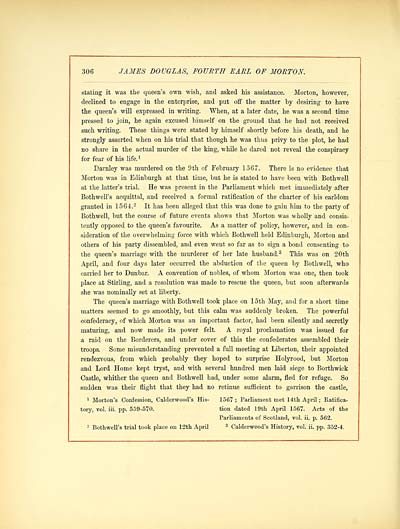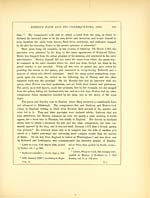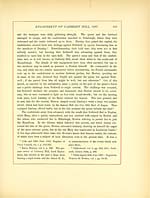Douglas book > Angus memoirs
(330) Page 306
Download files
Complete book:
Individual page:
Thumbnail gallery: Grid view | List view

306 JAMES DOUGLAS, FOURTH EARL OF MORTON.
stating it was the queen's own wish, and asked his assistance. Morton, however,
declined to engage in the enterprise, and put off the matter by desiring to have
the queen's will expressed in writing. When, at a later date, he was a second time
pressed to join, he again excused himself on the ground that he had not received
such writing. These things were stated by himself shortly before his death, and he
strongly asserted when on his trial that though he was thus privy to the plot, he had
no share in the actual murder of the king, while he dared not reveal the conspiracy
for fear of his life. 1
Darnley was murdered on the 9 th of February 1567. There is no evidence that
Morton was in Edinburgh at that time, but he is stated to have been with Bothwell
at the latter's trial. He was present in the Parliament which met immediately after
Bothwell's acquittal, and received a formal ratification of the charter of his earldom
granted in 1564. 2 It has been alleged that this was done to gain him to the party of
Bothwell, but the course of future events shows that Morton was wholly and consis-
tently opposed to the queen's favourite. As a matter of policy, however, and in con-
sideration of the overwhelming force with which Bothwell held Edinburgh, Morton and
others of his party dissembled, and even went so far as to sign a bond consenting to
the queen's marriage with the murderer of her late husband. 3 This was on 20th
April, and four days later occurred the abduction of the queen by Bothwell, who
carried her to Dunbar. A convention of nobles, of whom Morton was one, then took
place at Stirling, and a resolution was made to rescue the queen, but soon afterwards
she was nominally set at liberty.
The queen's marriage with Bothwell took place on 15th May, and for a short time
matters seemed to go smoothly, but this calm was suddenly broken. The powerful
confederacy, of which Morton was an important factor, had been silently and secretly
maturing, and now made its power felt. A royal proclamation was issued for
a raid on the Borderers, and under cover of this the confederates assembled their
troops. Some misunderstanding prevented a full meeting at Liberton, their appointed
rendezvous, from which probably they hoped to surprise Holyrood, but Morton
and IiOrd Home kept tryst, and with several hundred men laid siege to Borthwick
Castle, whither the queen and Bothwell had, under some alarm, fled for refuge. So
sudden was their flight that they had no retinue sufficient to garrison the castle,
1 Morton's Confession, Calderwood's His- 1567; Parliament met 14th April ; Ratifica-
tory, vol. iii. pp. 559-570. tion dated 19th April 1567. Acts of the
Parliaments of Scotland, vol. ii. p. 562.
2 Bothwell's trial took place on 12th April 3 Calderwood's History, vol. ii. pp. 352-4.
stating it was the queen's own wish, and asked his assistance. Morton, however,
declined to engage in the enterprise, and put off the matter by desiring to have
the queen's will expressed in writing. When, at a later date, he was a second time
pressed to join, he again excused himself on the ground that he had not received
such writing. These things were stated by himself shortly before his death, and he
strongly asserted when on his trial that though he was thus privy to the plot, he had
no share in the actual murder of the king, while he dared not reveal the conspiracy
for fear of his life. 1
Darnley was murdered on the 9 th of February 1567. There is no evidence that
Morton was in Edinburgh at that time, but he is stated to have been with Bothwell
at the latter's trial. He was present in the Parliament which met immediately after
Bothwell's acquittal, and received a formal ratification of the charter of his earldom
granted in 1564. 2 It has been alleged that this was done to gain him to the party of
Bothwell, but the course of future events shows that Morton was wholly and consis-
tently opposed to the queen's favourite. As a matter of policy, however, and in con-
sideration of the overwhelming force with which Bothwell held Edinburgh, Morton and
others of his party dissembled, and even went so far as to sign a bond consenting to
the queen's marriage with the murderer of her late husband. 3 This was on 20th
April, and four days later occurred the abduction of the queen by Bothwell, who
carried her to Dunbar. A convention of nobles, of whom Morton was one, then took
place at Stirling, and a resolution was made to rescue the queen, but soon afterwards
she was nominally set at liberty.
The queen's marriage with Bothwell took place on 15th May, and for a short time
matters seemed to go smoothly, but this calm was suddenly broken. The powerful
confederacy, of which Morton was an important factor, had been silently and secretly
maturing, and now made its power felt. A royal proclamation was issued for
a raid on the Borderers, and under cover of this the confederates assembled their
troops. Some misunderstanding prevented a full meeting at Liberton, their appointed
rendezvous, from which probably they hoped to surprise Holyrood, but Morton
and IiOrd Home kept tryst, and with several hundred men laid siege to Borthwick
Castle, whither the queen and Bothwell had, under some alarm, fled for refuge. So
sudden was their flight that they had no retinue sufficient to garrison the castle,
1 Morton's Confession, Calderwood's His- 1567; Parliament met 14th April ; Ratifica-
tory, vol. iii. pp. 559-570. tion dated 19th April 1567. Acts of the
Parliaments of Scotland, vol. ii. p. 562.
2 Bothwell's trial took place on 12th April 3 Calderwood's History, vol. ii. pp. 352-4.
Set display mode to:
![]() Universal Viewer |
Universal Viewer | ![]() Mirador |
Large image | Transcription
Mirador |
Large image | Transcription
Images and transcriptions on this page, including medium image downloads, may be used under the Creative Commons Attribution 4.0 International Licence unless otherwise stated. ![]()
| Histories of Scottish families > Douglas book > Angus memoirs > (330) Page 306 |
|---|
| Permanent URL | https://digital.nls.uk/96535754 |
|---|
| Attribution and copyright: |
|
|---|---|
| Description | A selection of almost 400 printed items relating to the history of Scottish families, mostly dating from the 19th and early 20th centuries. Includes memoirs, genealogies and clan histories, with a few produced by emigrant families. The earliest family history goes back to AD 916. |
|---|

